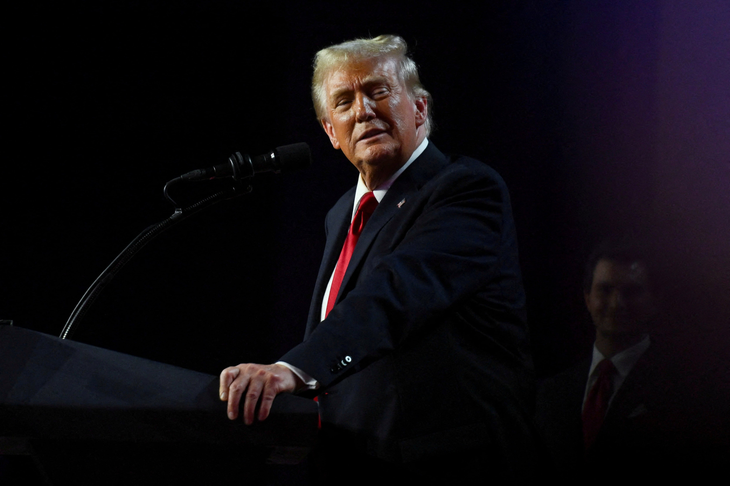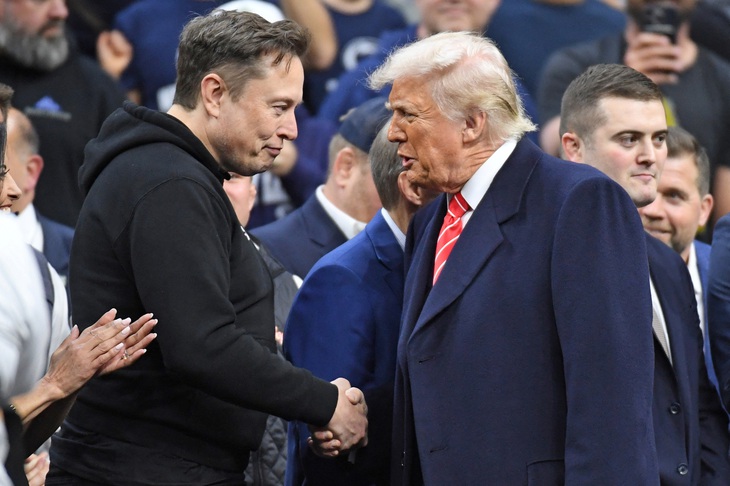Could Elon Musk and New York mayoral candidate Zohran Mamdani have their citizenship revoked?
Could billionaire Elon Musk and congressman Mamdani lose their US citizenship? This is the shocking question being asked amid the wave of controversy over citizenship under new policies.

US President Donald Trump – Photo: REUTERS
While deportation campaigns have previously targeted illegal immigrants, the focus now appears to be expanding to include naturalized US citizens – a quiet movement that could reshape the understanding of the concept of “belonging to America”.
Time magazine reported that US President Donald Trump has recently mentioned the possibility of deporting two naturalized US citizens, billionaire Elon Musk and New York mayoral candidate Zohran Mamdani.
This information has raised questions about whether the upcoming deportation campaign could include people who already have US citizenship.
Mr. Trump raised the possibility of reconsidering naturalization citizenship.
Last week, President Trump attracted public attention when he announced that he was “taking a close look at the naturalization applications” of individuals such as billionaire Elon Musk and congressman Zohran Mamdani, with suspicions that fraud may have occurred during the naturalization process.
Although he has not provided a specific legal basis, Mr. Trump left open the possibility of using executive power to take measures such as revoking citizenship or deportation if “any fraud” is discovered in the naturalization process.
Legally, many experts say that deporting US citizens is unconstitutional.
However, current law still allows for denaturalization in cases where there is evidence of fraud during naturalization – a legal tool that can be used in exceptional situations.
The process of stripping citizenship only applies to naturalized citizens, and this group currently accounts for more than 7% of the US population, equivalent to more than 25 million people.
Historically, the process of revoking US citizenship has been used in a variety of contexts, including cases of Asian-Americans, those with leftist views, those who have lived abroad for a long time, or those who are deemed to be “unpatriotic.”
The Nationality Act of 1940 extended the ability to strip citizenship, even to US-born citizens, if they voted or served in a foreign military, or evaded military service during wartime.
A major turning point came in 1967, when the US Supreme Court declared that citizenship—whether acquired by birth or naturalization—is a constitutional right that cannot be arbitrarily taken away by the government.
However, the ruling retains some exceptions, such as cases of naturalization fraud or war crimes – legal grounds that are still valid.

Mr. Trump and billionaire Musk were very close before tensions erupted, to the point that the president did not hesitate to consider stripping Mr. Musk of his citizenship – Photo: REUTERS
New policy priorities?
Under the Obama administration, the Department of Homeland Security launched an initiative called Operation Janus to crack down on naturalization fraud, using biometric data such as fingerprints for verification.
However, the first case of citizenship being revoked under this program only appeared in January 2018, when Donald Trump took office as president.
According to Professor Cassandra Burke Robertson of Case Western Reserve University, the US administration during Mr. Trump’s first term has stepped up the implementation of measures related to the revocation of citizenship.
Data from the Open Justice Initiative shows that the number of annual revocations of citizenship during this period nearly doubled compared to the previous administration.
In 2020, the US Department of Justice established a specialized unit called the Denaturalization Section, which is responsible for investigating and handling cases of alleged illegal naturalization, including those related to terrorism, war crimes, sex crimes, and fraud.
Although the number of successful denaturalization cases is still limited, the Immigrant Legal Resource Center (ILRC) warns that creating such a specialized unit could set a legal precedent and cause fear among legal immigrants who want to apply for US citizenship.
A Justice Department memo released on June 11 identified revocation of citizenship as one of its top priorities, with the goal of “revoking citizenship from anyone who has committed a crime and is likely to pose a threat to the United States.”
However, the National Association of Criminal Defense Lawyers (NACDL) expressed concerns about the wording of the directive, saying it lacked transparency, could violate constitutional principles, and was vulnerable to abuse.
In that context, legal experts say that the possibility of stripping citizenship from billionaire Elon Musk or congressman Zohran Mamdani is very low, unless there is clear evidence of fraud in the naturalization application, something that has not yet been established.
“This statement can be understood as a move to exert political pressure rather than a specific legal basis,” said professor Michael Kagan from the University of Nevada.
However, historical precedents still cause concern for many. Professor Patrick Weil, a scholar specializing in US citizenship policy, has warned that the concept of “loyalty to the United States” has been interpreted flexibly by the government many times, leading to the elimination of individuals who are considered inconsistent with the interests or political views of the current government.
With the Supreme Court now widely seen as favoring Trump’s policies, some experts do not rule out the possibility that the revocation provision could be interpreted broadly in the near future.
News
A rising country music singer speaks out about his family member arrested by ICE
When a family member of a popular country music singer was arrested by ICE, he spoke out publicly about the…
The long-standing conflict between Rosie O’Donnell and Donald Trump flared up again after she called for the president to resign.
Rosie O’Donnell demands Trump’s removal from office over Kennedy Center honor in latest tirade White House previously said O’Donnell suffers…
Ella Langley Just Accomplished Something No Other Solo Female Country Artist Has in This Decade
Ella Langley has added another entry to the record books. The country singer’s track “Choosin’ Texas” has been collecting records…
Blake Shelton and John Legend’s Christmas party was chaotic. And the Christmas tree wearing a tattered cowboy hat was the highlight!
Blake Shelton’s Christmas Tree Topper Had John Legend Frazzled: “What Is This?” If only The Oddest Couple, starring The Voice Coaches, became a…
MICHAEL Buble has given fans a rare glimpse into his home life following his shock departure from The Voice.
Michael Buble gives rare glimpse into his home life as he releases surprise documentary after leaving The Voice The singer, 50, stepped…
The lawsuit involving a woman claiming to be Miley Cyrus’s mother has become even more outrageous after she decided to reveal the truth about the story.
Woman Who Claims To Be The Mother Of Miley Cyrus Reveals Why She Chose That Name…Except Miley Isn’t Actually Her…
End of content
No more pages to load












